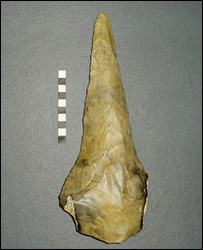This feed is from the NEW There's Something About Harry Website at Something-About-Harry.com
BBC NEWS | Science/Nature | Front garden yields ancient tools
Jun 21, 2006
I'm facinated by archaeology and history. These sciences help us understand where we came from and possibly help provide us insights into where we are going. If we're really smart, maybe even a lesson or two about how to avoid mistakes along the way.
The BBC is reporting today that handheld tools found in a sandy area that probably was a riverbed 250,000 years ago yielded a 307mm (1 foot long) hand axe created by Neanderthals.
The tool is complicated enough in design, which requires forethought, and construction, which would require communication of technique, that science has gained more understanding about how much more intelligent this earlier form of human was in comparison to some of our previous theories.
Science has to start out without making any assumptions about the subject of their study. They have a fossil record that indicates an evolution of hominids into modern day humans. They know that we are intelligent today. Science is still learning just how intelligent chimpanzees and other creatures are, but they do not know how intelligent hominids in between humans and chimpanzees might have been without looking at the construction of their habitats, tools, and lifestyles.
The search for intelligence on our planet is starting to evolve from a search to prove the level to a search to understand and interpret the intelligence that is there. There are raging debates over the intelligence of chimpanzees that can communicate with sign language, as well as create and use their own tools for various tasks, all of which in earlier days were qualifications for intelligence. Similarlly, whales and dolphins have been studied and recent research indicates that they not only communicate, but they very possibly have given each other names.
More and more the search for intelligence seems to be not a search for intelligent life forms on our planet, but an education for ourselves, teaching us how to understand the intelligence that has been present and around us all along.
Many cultures have practiced animistic religions, some of which would put a god or spirit like figure into an inanimate object and soem religions that would give an intelligent spirit to that of animals. Removing the religious pretexts from this scenario, and looking at what is left shows us that in some basic ways, people have understood that other animals and even objects possess some form of intelligence.
Physics is moving closer and closer towards a point where what appears to be inanimate objects posses some form of interactivity with the animate. As Einstein's theories would suggest, there must be some relationship between the mass and energy associated with objects not only by themselves but in a group of other objects, which would include rocks, animals and people not to mention the planet and solar system and beyond.
Science appears to be bringing back information showing a more and more consistent relationship between the disciplines pointing towards a common theme. We are all connected.
BBC NEWS Science/Nature Front garden yields ancient tools:
"'To my mind, this helps prove that these people were not so far away from us as some would think and also that they were probably using language.' "












Interesting article (and more accessible most likely than the original on a busy Sat morn).
This idea intrigues and inspires me: 'inanimate objects pose some form of interactivity with the animate.'
I found thi squote a few days ago and was going to use it in my Housing Co-operative Newsletter but it also seems apt to share it here:
(need to overlook the gender bias language)
"A human being is part of a whole, called by us the 'Universe' a part limited in time and space. He experiences him, his thoughts and feelings, as something separated from the rest -- a kind of optical delusion of his consciousness. This delusion is a kind of prison for us, restricting us to our personal desires and to affection for a few persons nearest us. Our task must be to free ourselves from this prison by widening our circles of compassion to embrace all living creatures and the whole of nature in its beauty." ---Albert Einstein---
Thanks
Skanks